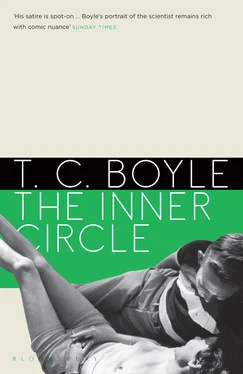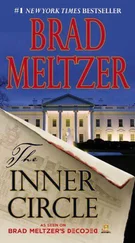But on the day of my graduation, I didn’t yet know of Prok’s uncompromising view of what he considered frivolous pursuits — or at least not to the extent I one day would — and the look he gave us over an innocent game of croquet gave me pause. I tried to parse that look. Tried to decipher what it portended — was the celebration over? Had my mother said something to him — or he to her — that would have changed the complexion of the day? Did my mother know about Prok and me — or Mac and me — and had she said something?
As it turned out, it was none of the above, just Prok being Prok. And we finished our game and went back to the shady spot on the lawn and Prok retired to the house a moment and came back with a gift for my mother — an especially convoluted but bred-out gall he’d shellacked as an objet d’art — and when she thanked him I saw the hint of a mutuality there and I didn’t know how I felt about it. There was something complicit between them, and I realized in that moment that it had nothing to do with me: Prok, I guessed, had been talking up the project and had convinced her, as he convinced practically everyone he ran across, to give up her history. My mother’s history. She would sit with him for two hours the next day, or maybe even that evening, and answer the three hundred and fifty questions about her masturbatory habits and how often she brought herself to orgasm and what men she’d slept with since my father died.
Everything gets a bit hazy here, and I don’t know if what happened next was a direct result of this or not — again, that would take a psychiatrist to iron out, and Prok hated psychiatrists — but I do know that I excused myself from the group gathered on the lawn, left Iris there, and my mother too, and went up the winding path for the house, where I knew Mac was preparing something, a light snack, she’d said, for all us. I went in without knocking, an honored guest by this point, almost a member of the family. The children were nowhere to be seen. Everything was still. The furniture seemed to recede into the depths of the room, shadowy and skeletal, the records canted on the shelves as if awaiting the hand to bring them to life. Distantly, from all the way across the yard, I heard the buzz of voices.
I found Mac in the kitchen, at the counter, her back to me. She was barefooted still, but she’d put an apron on over her dress and I could see where it was tied just above the swell of her hips. Do I have to tell you how much I needed her in that moment, how much a disciple of the master I’d become? I came up behind her — and she knew I was there, she was waiting for me — and pressed myself to her so she could feel the hardness of me against the softness of her buttocks, and I reached both hands round to embrace her breasts. The sweetest thing: she turned her head to kiss me, to give me the excitation of her tongue and underscore the reciprocity of the moment. And then — and then we were down on the kitchen floor, pawing at each other’s clothes. No children appeared. No one intruded. And I had coitus with her there in a quick wild spate of thrusting and licking and biting that must have taken no more than three minutes beginning to end, and then I zippered up and went back out across the lawn to Iris and my mother.
Ever since the fall of 1938, when Prok inaugurated the marriage course, there had been whispers on campus and in the community too, and the whispers grew to a rumble of distaste and then outrage as the summer of 1940 gave way to autumn and a coalition of forces gathered against him. If I’d wondered at the number of faculty — and especially older faculty — attending the session of the course Laura and I had taken together, now I began to understand: these were spies, hostile witnesses, the drones of convention and antiquated morality who wanted to keep the world in darkness as far as sex was concerned. They weren’t there to be educated — they were there to bring Prok down.
Foremost among them was Dr. Thurman B. Rice of the Indiana State Health Board and the IU medical faculty. Rice had himself taught a precursor to Prok’s course in the early thirties—“a hygiene course,” he called it — and it had been one of the running jokes of the campus, an exercise in innuendo, misinformation and Victorian nice-nellyism. Apparently, he’d sat through the lecture in which Prok showed his infamous slides, and protested, in writing, to President Wells, the Board of Trustees and Prok himself that the pictures were so graphic as to have stimulated even him — a man thirty years married, who had given the subject “real objective study”—and that, as a result, he feared for the student body. What if some innocent coed were to be so stimulated and wind up engaging in sexual intercourse, becoming pregnant and having to be sent home as damaged goods? What then?
He was joined by the rest of his colleagues on the medical faculty, who as one felt that Professor Kinsey was appropriating to himself what was essentially a medical function: how could he presume to interview and advise students of both sexes on physiological matters — behind closed doors, nonetheless — when he had no medical training himself? Add to this the unanimous outcry of the town’s pastors, a cascade of letters from distraught Hoosier mothers who had heard rumors that this professor was instructing their daughters in the various methods of birth control and asking them to measure their own clitorises, and the undying enmity of Dean Hoenig, who would never forgive Prok that display in the garden and what she deemed his overzealous pursuit of the histories of some of the more reticent undergraduate women under her aegis, and you can well imagine that a public lynching was in the cards.
I was crossing campus on a dead-calm, slow-roasting morning at the beginning of September, on my way to work, thinking of nothing more significant than what I was going to do about dinner, when all of this — the rumors, the rancor, the anti-Prok sentiment boiling up out of the cauldron of the community — came home to me in an immediate way. Laura Feeney, a senior now and even prettier and fuller of figure than I’d remembered, was coming toward me along the path by the brook, a text clutched to her breasts (between which dangled a chain decorated with a class ring presumably belonging to Jim Willard). When she glanced up and recognized me, a change came over her face and she stopped in midstride and just stood there motionless until I closed the distance between us. “Laura,” I said, awkward suddenly — awkward again—“hello.”
It took her a moment. “John,” she murmured, something tentative in the tone of her voice, as if she were trying the name out to see if it fit. “Oh, hello. So nice to see you.” A pause. “And how was your summer?”
We could have been having the same conversation we’d had a year ago, except that this time I hadn’t gone home to the crucifixion of boredom that was Michigan City and the attic room in my mother’s house, because I was out in the world now, working a full-time job, and I’d stayed on at Mrs. Lorber’s, though Paul Sehorn was gone and I would soon have a new roommate — that is, if anyone answered Mrs. Lorber’s ad. I watched her face through the formalized exchange of ritualistic chitchat — she was a master at it, or rather, a mistress — and then I got bold and commented on the chain round her neck. “I see you’re wearing Jim Willard’s class ring.”
“What? Oh, this?” (An excuse to brush her own breasts and lift the ring to eye level.) She let out a laugh that was meant to be self-deprecating, but managed only to be flirtatious. My interest piqued. “You’re not going to believe this, but I’ve traded in one Willard for another.” Again, the laugh. “You know Willard Polk?”
Читать дальше












